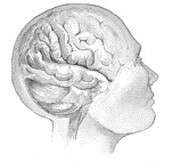Childhood socioeconomic status affects brain volume

(HealthDay) -- Childhood socioeconomic status affects hippocampal volume in older adults, after adjusting for adult socioeconomic status, gender, education, and other factors, according to a study published in the May issue of the Annals of Neurology.
Roger T. Staff, Ph.D., of the Aberdeen Royal Infirmary in the United Kingdom, and colleagues used magnetic resonance imaging of the brain to measure whole brain and hippocampal volume in 249 volunteers without dementia who were born in 1936. Childhood socioeconomic status history was recorded and mental ability at age 11 (recorded in 1947) was available for all participants.
After adjusting for mental ability at age 11 years, adult socioeconomic status, gender, and education, the researchers observed a significant association between childhood socioeconomic status and hippocampal volume.
"Early life socioeconomic conditions contribute to hippocampal volume in late adulthood independently of later life circumstances," the authors conclude. "These findings suggest that the capacity to compensate for age-related neuropathology (reserve) may well be established in early life."
More information:
Abstract
Full Text (subscription or payment may be required)
Copyright © 2012 HealthDay. All rights reserved.














